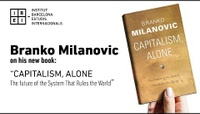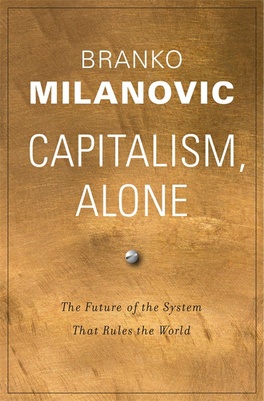Book presentation: "Capitalism, Alone: The Future of the System That Rules the World" by Branko Milanovic
Available in video:
With:
Branko Milanovic, Visiting Presidential Professor, The Graduate Center, CUNY; Senior Scholar, Stone Center on Socio-economic Inequality; Visiting Researcher, Institut Barcelona d’Estudis Internacionals (IBEI)Chair & discussant: Pablo Astorga, Senior Research Fellow, Institut Barcelona d’Estudis Internacionals (IBEI)
Discussant: Francesc Amat, Research Fellow, Institutions and Political Economy Research Group (IPErG-UB), Universitat de Barcelona
"A provocative account of capitalism’s rise to global dominance and, as different models of capitalism vie for world leadership, a look into what the future may hold."
We are all capitalists now. For the first time in human history, the globe is dominated by one economic system. In Capitalism, Alone, leading economist Branko Milanovic explains the reasons for this decisive historical shift since the days of feudalism and, later, communism. Surveying the varieties of capitalism, he asks: What are the prospects for a fairer world now that capitalism is the only game in town? His conclusions are sobering, but not fatalistic. Capitalism gets much wrong, but also much right―and it is not going anywhere. Our task is to improve it.
Milanovic argues that capitalism has triumphed because it works. It delivers prosperity and gratifies human desires for autonomy. But it comes with a moral price, pushing us to treat material success as the ultimate goal. And it offers no guarantee of stability. In the West, liberal capitalism creaks under the strains of inequality and capitalist excess. That model now fights for hearts and minds with political capitalism, exemplified by China, which many claim is more efficient, but which is more vulnerable to corruption and, when growth is slow, social unrest. As for the economic problems of the Global South, Milanovic offers a creative, if controversial, plan for large-scale migration. Looking to the future, he dismisses prophets who proclaim some single outcome to be inevitable, whether worldwide prosperity or robot-driven mass unemployment. Capitalism is a risky system. But it is a human system. Our choices, and how clearly we see them, will determine how it serves us.
More information about the book
Branko Milanovic is a Visiting Presidential Professor at the Graduate Center City University of New York and Senior Scholar at the Stone Center for Socio-economic Inequality. Currently, he is a Visiting Researcher at Institut Barcelona d’Estudis Internacionals (IBEI).
He obtained his Ph. D. in economics (1987) from the University of Belgrade with a dissertation on income inequality in Yugoslavia. He served as lead economist in the World Bank’s Research Department for almost 20 years, leaving to write his seminal book on global income inequality, Worlds Apart (2005). He was senior associate at the Carnegie Endowment for International Peace in Washington (2003-2005) and has held teaching appointments at the University of Maryland (2007-2013) and at the Paul H. Nitze School of Advanced International Studies at Johns Hopkins University (1997- 2007).
Branko Milanovic’s main area of work is income inequality, in individual countries and globally, including in pre-industrial societies. In addition to numerous papers for the World Bank, he has published articles on these topics in Economic Journal, Review of Economics and Statistics, Journal of Economic Literature, and Journal of Political Philosophy, among others. His book, The Haves and the Have-nots (2011) was selected by The Globalist as the 2011 Book of the Year. His new book, Global Inequality (2016), was awarded the Bruno Kreisky Prize for the best political book of 2016 and was translated into twelve languages. It addresses economic and political effects of globalization, including the concept of successive “Kuznets waves” of inequality, largely driven, since the first industrial revolution, by technology and globalization. In October 2017, Milanovic was awarded (jointly with Mariana Mazzucato) the 2018 Leontief Prize for Advancing the Frontiers of Economic Knowledge.


